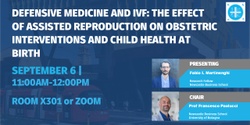Vhep Seminar - Defensive Medicine and IVF: the effect of assisted reproduction on obstetric interventions and child health at birth
Event description
We are excited to extend an invitation for the upcoming Value in Health Economics and Policy Group seminar titled “Defensive Medicine and IVF: the effect of assisted reproduction on obstetric interventions and child health at birth”
We are welcoming Dr Fabio Martinenghi (Research Fellow at the University of Newcastle).
Dr Martinenghi is an applied economist focusing on Health Economics, Law & Economics and Education. In his work, he studies policy-relevant issues by applying modern econometric tools to linked administrative datasets. Most recently, he has been developing a research agenda around the impacts of infertility and assisted reproduction on maternal and child outcomes. He is also an investigator within the Centre for Big Data Research in Health (NHMRC grant APP1127437), and an affiliate of the Tax and Transfer Policy Institute and of the Life Course Centre.
The seminar will be chaired by Dr Mesfin Genie (Lecturer in Health economics at the University of Newcastle).
Abstract
A growing share of the world’s population is being born via assisted reproductive technology (ART), including in-vitro fertilisation (IVF). However, two concerns persist. First, ART pregnancies correlate with predictors of poor outcomes at birth—and it is unclear whether this relationship is causal. Second, the emotional and financial costs associated with ART-use might exacerbate defensive medical behaviour, where physicians intervene more than necessary to reduce the risk of adverse medical outcomes and litigation. We address the challenge of identifying the pure effect of ART-use on both maternal and infant outcomes at birth by leveraging exogenous variation in the success of ART cycles.
We compare the obstetric outcomes for ART-conceived births with those of spontaneously-conceived births after a failed ART treatment. Moreover, we flexibly adjust for key confounders using double machine learning. We do this using clinical registry ART data and administrative maternal and infant data from New South Wales (NSW) between 2009-2017. We find that ART slightly decreases the risk of obstetric interventions, lowering the risk of a caesarean section and increasing the rate of spontaneous labour (+3.5 p.p.). Moreover, we find that ART has a statistically and clinically insignificant effect on infant health outcomes.
Tickets for good, not greed Humanitix dedicates 100% of profits from booking fees to charity

